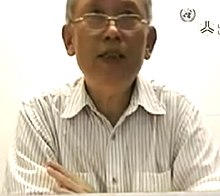Wang Shaoguang
Professor Wang Shaoguang | |
|---|---|
Vương thiệu quang | |
 Wang Shaoguang in a 2013UN Universityinterview | |
| Born | 1954 (age 69–70) Wuhan, Hubei,China |
| Nationality | Chinese |
| Academic background | |
| Alma mater | Peking University(LL.B., 1982) Cornell University(Ph.D., 1990) |
| Thesis | Failure of Charisma: The Cultural Revolution in Wuhan |
| Influences | Carl Schmitt[1] |
| Academic work | |
| Discipline | Political science |
| School or tradition | Chinese New Left |
| Institutions | Yale University(1990–2000) Chinese University of Hong Kong(1999–present) |
| Movements in contemporary |
| Chinese political thought |
|---|
 |
Wang Shaoguang(born 1954;[2]Chinese:Vương thiệu quang;pinyin:Wáng Shàoguāng) is a Chinese political scientist. He is currently an emeritus professor at the Department of Government and Public Administration of theChinese University of Hong Kong.A critic of Westernrepresentative democracy,his particular research interests include the history of theCultural Revolution,sortition,thewelfare state,and thecomparative politicsof East Asia.[3]
Life
[edit]Born inWuhan,Hubei,Wang worked as a high school teacher in Wuhan from 1972 to 1977. He then studied atPeking University,graduating in 1982, and moved toCornell Universityin the U.S., where he received a doctorate in 1990. He taught atYale Universityfrom 1990 to 2000 before moving to theChinese University of Hong Kong,where he became a professor at the Department of Government and Public Administration.[3]In 1993, Wang co-authored the "Wang Shaoguang Proposal" with economistHu Angang,a public policy report that argued that the taxation reforms ofDeng Xiaopinghad weakened the Chinese state, and advocated fiscal centralisation in response.[4]
Views
[edit]Wang is a leading member of theChinese New Left.[5][6]
He is a critic of Westernrepresentative democracy,which he believes has failed and degenerated into "electocracy",[7]and more generally of the focus on competitiveelectionsas part of political reform. Wang argues that the view of democracy as primarilyelectoraldemocracy only became accepted in the postwar period, owing mainly to the work ofJoseph Schumpeterand his bookCapitalism, Socialism and Democracy.Instead, he states, the "people should be involved in the whole process of decision-making, not only in choosing the decision-makerper se".[8]
He also distinguishesaccountabilityfromresponsibilityand political responsiveness, holding that genuine democracy must combine all three:[7]"democratic" governments are often accountable in that they may be removed in competitive elections, Wang posits, but they are still not responsive to popular needs and demands.[8]
Works
[edit]- Failure of Charisma: The Cultural Revolution in Wuhan.Oxford and New York: Oxford University Press. 1995.ISBN0195859502.
- The Political Economy of Uneven Development: The Case of China.Armonk: M. E. Sharpe, Inc. 1999.ISBN9780765602039,withHu Angang.
- The Chinese Economy in Crisis: State Capacity and Tax Reform.Armonk: M. E. Sharpe, Inc. 2001.ISBN9780765607652,withHu Angang.
References
[edit]- ^Sapio, Flora (7 October 2015)."Carl Schmitt in China".The China Story.Archived fromthe originalon 29 July 2019.Retrieved29 July2019.
- ^Date information sourced from Library of Congress Authorities data, via correspondingWorldCatIdentitieslinked authority file (LAF).
- ^ab"Shaoguang Wang".Chinese University of Hong Kong.Retrieved30 July2019.
- ^Van Dongen, Els (2019).Realistic Revolution: Contesting Chinese History, Culture, and Politics after 1989.Cambridge:Cambridge University Press. pp. 41–2.ISBN978-1108421300.
- ^Shi Anshu; Lachapelle, François; Galway, Matthew (2008)."The recasting of Chinese socialism: The Chinese New Left since 2000".China Information.32(1): 140–159: 144.doi:10.1177/0920203X18760416.
- ^Li He (2009)."China's New Left"(PDF).East Asian Policy.1(1): 30–37: 32.S2CID21871195.Archived fromthe original(PDF)on 27 February 2019.
- ^abZhou Lian (2012)."The Debates in Contemporary Chinese Political Thought".In Dallmayr, Fred; Zhao, Tingyang (eds.).Contemporary Chinese Political Thought: Debates and Perspectives.Lexington:University Press of Kentucky. pp. 26–45: 32.ISBN978-0813136424.
- ^abFrenkiel, Émilie (15 July 2009)."Political change and democracy in China: An interview with Wang Shaoguang".Books & Ideas.Retrieved30 July2019.
Further reading
[edit]- "Traditional Moral Politics and Contemporary Concepts of Governance".Reading the China Dream.Translated by David Ownby.Interview with Wang Shaoguang by journalist Ma Ya, originally published in 2012.
External links
[edit]- Faculty pageat Chinese University of Hong Kong
